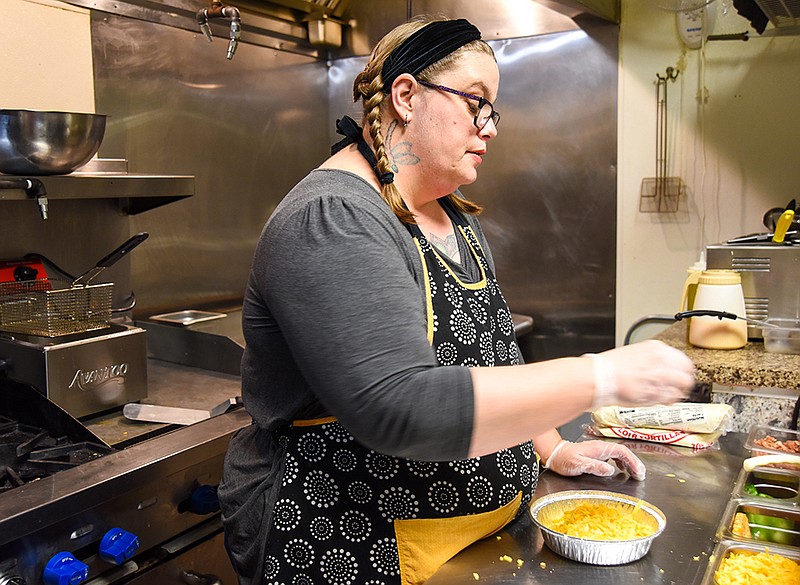Small businesses are often seen as the heart of a community's character and economy, and Jefferson City businesses are no different.
Amanda Jensen and her husband have run La Chica Loca, a popular downtown spot, for several years in different capacities, as a food truck and in its current home at 306 E. High St. Despite a series of challenges for businesses in the area, from natural disasters to a pandemic, she said the community fostered a welcoming environment for small businesses like theirs.
"Small business is the heart of Jefferson City," Jensen said. "I'm grateful our community makes it a priority to shop and dine local. Through all the challenges and aftermath of the tornado and COVID, our community has continued to make a point to support their neighbors in business."
La Chica Loca is one of a myriad of small businesses that contribute to the local economy and the Capital City's culture, helping to make it one of the communities most defined and dependent on its unique businesses in Missouri.
The Jefferson City metropolitan statistical area ranked No. 115 among all U.S. metros for dependence on small businesses (defined as firms with fewer than 499 employees) in a new report, a wide lead over other Missouri communities included in the list. The report, sourced from U.S. Census Bureau data, found just more than half of the metro's workforce -- 51.5 percent of workers -- were employed by small businesses. Those 28,737 workers took in more than 46 percent of the area's total payroll, per the report.
These statistics, when combined with the number of small businesses per 10,000 people (181), the total number of small businesses with employees (2,723) and the total annual payroll at these small businesses (more than $1 billion) earned the community a composite score of 60.9 -- far higher than the rest of the Show-Me State's metros.
Springfield, the next-highest ranked community in Missouri, came in at No. 162 with a score of 51.53. The mid-sized metro's workforce was made up of 47.8 percent small-business employees, per the report, amounting to 41.8 percent of the total payroll.
Nearby Columbia came in at No. 233 with a score of 38 and more than 47 percent of the area's workforce working for small businesses, making up almost 40 percent of its payroll. St. Louis came in at No. 237 with a score nearing 37, 45 percent of the workforce and 37 percent of the payroll from small-business employees. Kansas City ranked No. 255, scoring 33.8 with 44 percent of its workforce and 38.5 percent of its payroll belonging to small businesses.
St. Joseph and Joplin rounded out the bottom of the list at No. 321 and 330, respectively. St. Joseph scored 18.6 with 41 percent of workers in small businesses and 34 percent of the area's payroll going to them, while Joplin scored 16 with around 40 percent of workers employed by small businesses and 33 percent of payroll going to those firms.
Missouri as a whole, meanwhile, ranked fairly low compared to other states. With a score of 28.5 and around 45 percent of its workforce employed by small businesses, it was the 39th ranked state in the U.S. in the report.
The report found more than 1 million Missourians worked for small businesses and that sector of the market made up more than $47 billion in total annual payroll for the state.
The report, compiled by investment firm Smartest Dollar, found locations with smaller populations were more dependent on small businesses, with rural states Montana, Wyoming and Vermont taking the top spots.
The highest overall score, 99.7, went to Barnstable, Massachusetts, which reportedly had 68 percent of workers employed at small businesses, taking home 67 percent of the area's total payroll.
"Small businesses are the heart of the U.S. economy. Small businesses represent 99.9 percent of all businesses in the U.S., collectively employing nearly half of all U.S. employees and generating nearly half of U.S. annual GDP, according to data from the U.S. Small Business Administration," the report read. "But the past two years have been treacherous for many small businesses."
The onset of the COVID-19 pandemic saw a seismic disruption for the small-business sector, temporarily shuttering 43 percent of small businesses across the first half of 2020, according to the report. Continued issues, such as supply chain disruptions and inflation, continue to cause headaches for small firms.
Despite increased attention in the wake of the past couple of years, the report pointed to a steady decline in the small-business market over the past several decades. Small-business employment and payroll dropped nearly 10 percent since the 1980s, according to the report. The authors speculated the rise of larger firms and their ability to crowd out smaller businesses might be contributing factors to a decades-long decline.
Agriculture, Missouri's most prominent industry, made up more than 80 percent of small-business employees and payroll, per the report. Construction, real estate and food and accommodation services were also high on the list of small business sectors.

